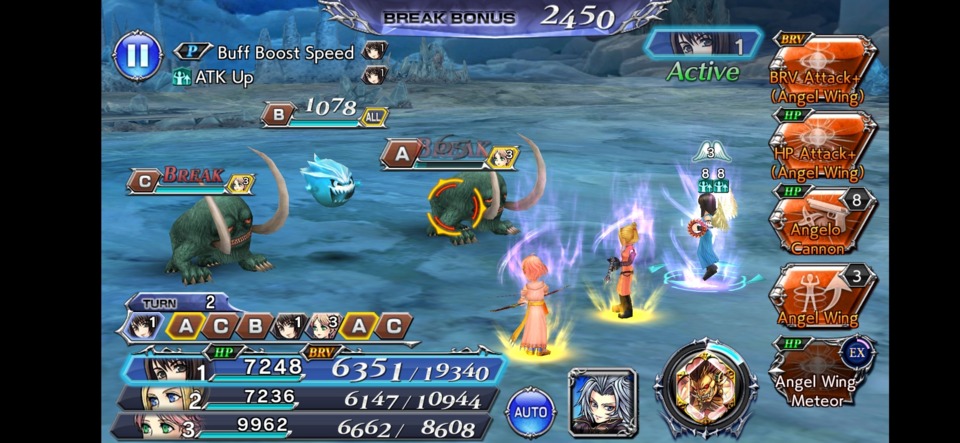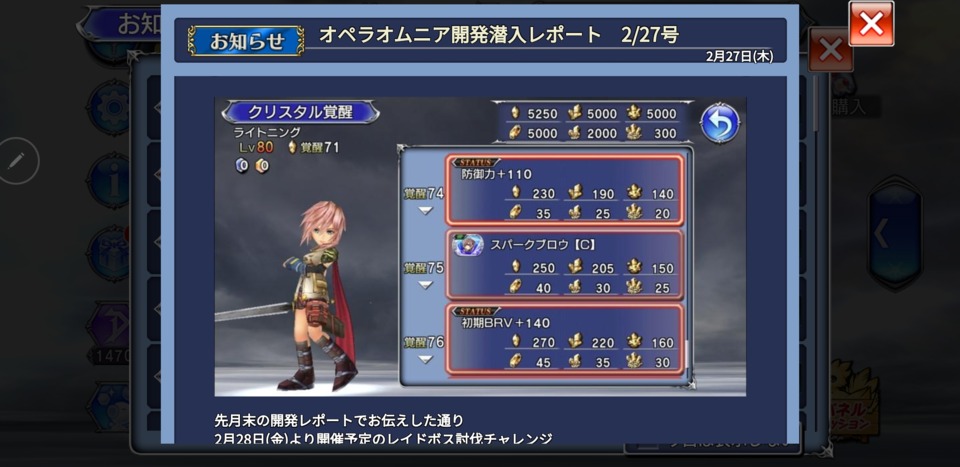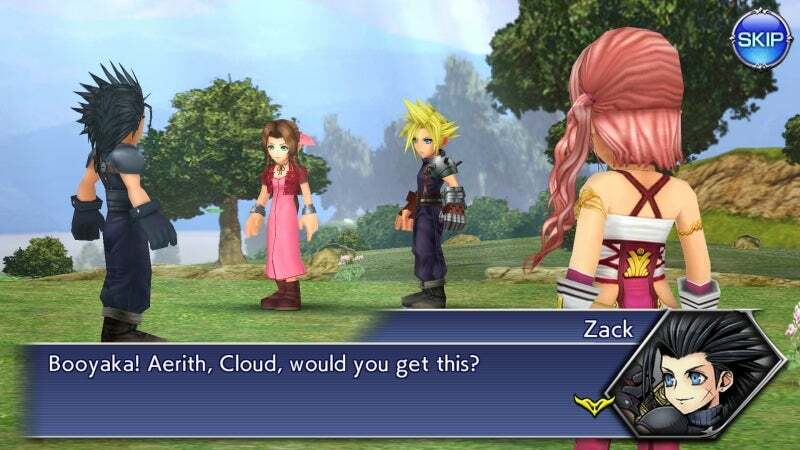Opera Omnia Clears A Very Low Bar In Being The Most "Responsible" Gacha Game I Have Ever Seen
By ZombiePie 4 Comments
Preamble
Last year, many of you may recall a blog I wrote lamenting Mobius Final Fantasy's shutdown. For those who may have missed it, I spent over 100 hours playing Mobius. While I would struggle to call the game "good," it got me, and at no point did I feel exploited by its gacha mechanics. However, its closure leads to a conversation I continue to have about game preservation on the industry's mobile front. Gacha games are a dime a dozen, and few, if any, have any hope of being emulated should their dev teams pull the plug for whatever reason. It's a meaningful discussion, especially when it comes to the Final Fantasy franchise, as the series has COUNTLESS mobile efforts that have effectively become "lost media." Say what you will about such "venerated titles" like All The Bravest, Final Fantasy Agito, or Final Fantasy Airborne Brigade. Those titles are dead, and with no hope of emulation coming to the rescue, they pose a massive predicament for hobbyists and historians alike.
However, today we are not here to discuss the murky waters of mobile game preservation. Instead, we are here to talk about Dissidia: Final Fantasy Opera Omnia (i.e., Opera Omnia). Ever since Mobius died, my tolerance for gacha game "trappings" has oscillated. Sure, there's something about them that gives me a rush that other titles or genres don't provide, and I can only assume that is by design. However, the idea everything I work for can suddenly disappear rubs me the wrong way. Then there are all of the moral and ethical quandaries posed by gacha games. In my limited time playing games in 2021, Opera Omnia is both the most surprisingly good game I have played and one of the more nefarious. It is an oddly ambitious mobile title with a ton of hidden depth. Nonetheless, it is also a gacha game at its heart, and that limits my ability to appreciate it even at face value. To be perfectly blunt, whenever I play a gacha game, I feel like I have a Sword of Damocles looming over me.
Wait, There's A Story In Dissidia Final Fantasy: Opera Omnia?
As its title might suggest, Opera Omnia is a mobile game set in the Dissidia "multiverse." This point means the game features every possible Final Fantasy character imaginable, all assembled to address a cross-dimensional disaster. As with anything in the Dissidia universe, there's a bunch of referential humor. Surprisingly, the fanservice, while pandering, is well done. In fact, Opera Omnia's story is what surprised me the most. Every character has their quirks and idiosyncrasies intact, and certain characters play off each other perfectly. For example, there's a scene when all of the orphans in the Final Fantasy franchise tell Tidus that he's lucky even to have a father to reconcile with in the first place. There's another funny bit when Shantotto attempts to hit on Kuja, and her flirtatious gestures go over his head. Finally, there are the nigh dozen times when Y'shtola gets pissed off whenever someone calls her "a catgirl."
However, because this is a Dissidia game, there comes a "hard pivot" when the story turns dramatic and ramps up the stakes. While the first chapter of Opera Omnia is all about funny fanservice, the second chapter is when the game finally plays out its hand of cards. At the start of chapter two, your Mogg companion transforms into a giant dragon monster and unleashes a whole can of whoop-ass. The entire situation comes to a head when characters that are canonically "dead" in their respective games react poorly to the news. This tonal shift leads to many reflective moments in which characters debate their desire to save the world of Dissidia as doing so would likely return them to their home dimensions where they are guaranteed to meet their demise. I respect the effort that was put into these character moments and dialogue scenes. Unfortunately, I struggled to maintain my interest because of how heavy-handed all of these scenes felt.
EVERY Dissidia game makes some form of a hard pivot to make its nonsense world "work," and I hate it every time. These characters work so much better when they are just casually playing off their similarities and differences. Maybe you like the Type-0 characters, but I could not give a flying fuck about them here. That especially did not change when the game gave them nigh five dialogue sequences in which they debate their existential dread. My lack of enthusiasm also did not change when I got yet another different "flavor" of Sephiroth brooding over his progeny. These stumbling blocks highlight one of the shortcomings of Opera Omnia's story. If there are specific characters or Final Fantasy games that you do not enjoy, you are going to have to buckle up because EVERYONE gets at least ten minutes to share what they think of their station in their originating game. Sometimes these moments of introspection work, and other times, like when everyone tries to egg Tidus to forgive his father, are cringy as fuck. I will maintain with my dying breath that these games have always been at their best when they are silly fanservice nonsense with zero pretensions of greater storytelling aspirations. That's especially the case when you have Kefka elbowing Sephiroth in the background.
How Does It Play?

To no one's surprise, Opera Omnia uses the Dissidia franchise's Bravery Mechanic. For those of you who might not be familiar with this system, here's a quick summary. Every playable character in Dissidia has two health bars: health and bravery. Before you can do damage to any given enemy, you first need to eliminate their bravery. However, each character has specific moves that whittle down health or bravery, which applies to physical attacks and magical ones. The one thing about the Dissidia combat system that I have always enjoyed is that debuffs damage bravery or health on top of inflicting their status ailments. As many of you are all too familiar with, typically, you avoid using debuffs outside of boss battles as they rarely help you move forward in an enemy encounter.
What makes Opera Omnia "different" from the rest of the Dissidia series is that it is a turn-based RPG where you assemble parties of three characters. This point of differentiation allows the game to experiment with its class system, which is exhaustive given the game's massive cast of characters. Some characters, like Squall or Cloud, provide pure DPS but require assistance in collecting bravery. Conversely, there are characters like Hope, who are "Bravery Banks" whose sole purpose is to draw massive heaps of bravery and distribute them to the rest of your party. The game even has dedicated healers, magic-casters, and de-buffers. In my mind, Opera Omnia is, without a doubt, the best the Bravery System has ever looked. You feel inspired to give every character a shot before settling down on your "top three." Likewise, different encounters or missions favor different party compositions, so, you feel encouraged to try out and unlock new characters. Were it not for a handful of gacha traps, which we will discuss shortly, that alone would be enough to lead me to recommend the game. However, be warned, certain characters are better than others, and the game does a terrible job of communicating each character's utility.
While I commend the mechanics of Opera Omnia, its mission structure leaves a lot to be desired. Every act and chapter is splayed across a blurry environmental texture that involves hopping across hundreds of nodes, which dole out new characters and rewards. There will be cutscenes between the combat missions that allow a new character to present itself or for a pre-existing character to wrestle with the story's current events. After a few combat scenes, you'll see the next part of this storyline, and the payoff will occur after a boss battle or two. To call this format "safe" is an understatement. If anything, there are several occasions in which the game stretches simple character arcs well beyond their breaking points. For example, I did not need a five-act dramatic structure to let Noctis from Final Fantasy XV share his love for cooking. Luckily, the "Lost Episodes" provide new characters and character-based set pieces at a far better clip than the main story. In fact, if you are missing a Final Fantasy character you absolutely want, it is highly recommended you find their "Lost Episode" to unlock them post-haste.
What Are The Gacha Traps?
One of the main things that drove me up the wall is that this game has over twenty goddamn currencies, and each does something different. To make matters worse, the process for upgrading your characters is obtuse and incredibly frustrating, and as we will discuss shortly, I think this is a part of the game's DNA. Nonetheless, the UI is fiddly enough that I never felt like I could truly master the steps for upgrading items, equipment, and characters. The UI/UX is also painfully cluttered with notifications, health bars, and stamina meters. Finally, the in-game tutorial is atrocious. It's so bad and poorly translated it is not even funny. This flaw is highly problematic as it means players are bound to make mistakes in how they level up their characters or use their starting resources. Several of which will eventually require in-app purchases to restore or regain.
Quick aside, if you have "analysis paralysis," you will have a hard time playing Opera Omnia. There are over 100 characters, and each entails a somewhat Byzantine process to making them better. I had a hard time picking my initial trio of characters when starting the game. Even parsing out everyone's respective job classes can take a while. Right off the bat, you'll notice every character is assigned a "color," and that color signifies the type of crystal you need to expend to level them up. However, each color-coded crystal has six distinct varieties, and the amount of each type you need grows exponentially with every level. As if that were not enough, you have tokens, gems, one-use items, gil, and loot box tickets! It is a lot to take in and not for the faint of heart.

I'm not going to go over what all of these different trinkets do, but I will give you an idea of how you level up your characters. Full disclaimer, if you end up playing this game, you only need to worry about the crystals to complete the story. Nonetheless, the above image gives you a pretty good idea of what you need to go through to level up a single character. The level cap for the best characters is currently at 80, and you are going to need every type of crystal if you want to reach that cap. As you might expect, the last handful of these resources are acquired more quickly by shelling out actual money, and even if you grind for them in-game, they pop out at a snail's pace. That said, I have to commend Opera Omnia for doing two things that are not the norm with gacha games. First, it gives you enough starting resources to max out at least five or six characters if you know what you are doing. There are also one-time use Chocobo Feathers that allow you to circumnavigate the crystal system and level up characters even faster. Likewise, there are ways for you to gain everything you need without spending money. In fact, the missions that dole out the best drops and EXP are totally free, and the game directs you to them from the get-go. It is not out of the realm of possibility for you to have an army of your favorite Final Fantasy characters ready to lay waste on everything you face in Opera Omnia without spending any real-world money.
The big point of contention with any gacha game is whether it has loot boxes, and Opera Omnia indeed has them. The game rotates a fixed assortment of loot box receptacles daily and weekly. Each receptacle has the decency of listing which characters it will spew items for, but the best weapons and items' draw rates are meager. Likewise, you can tell the dev team play "favorites" as some characters are better represented in the game's blind packs than others. I played the game for around two months and never saw more than two purchasable loot boxes that did not unlock shit for Cloud. It is worth mentioning all of the playable characters are free. You can either unlock them by playing the story or through the character-specific episodes. The only character-based content that requires money or in-app purchases are alternate costumes or outfits, and before you ask, they are a waste of money.
What Makes It A "Responsible" Gacha Game?

First, the main campaign is entirely beatable without spending a single dollar. I finished both acts with a party of Beatrix, Lightning, and Cloud and only on a few occasions encountered anything capable of surviving three turns. Regardless, you have upwards of fifty hours' worth of content for basically free, and again, the story is admirable in how much effort it puts in to provide everyone with their fair share. The only time I honestly felt like I had hit Opera Omnia's "paywall" was when I tried beating the game on its highest difficulty, as well as when I tried tackling some of the game's timed special events. These tasks require you to "boost" your characters, and that's only realistically possible if you buy special packages. I know there are likely a handful of Opera Omnia fans who will chime in that even these challenges are possible to complete for free if you grind out levels or resources in alternate dimensions. While correct, the amount of time this process requires is insane.
On a more positive note, and I cannot emphasize this point enough, while I gave the Type-0 and XV cast a hard time, your favorite Final Fantasy character is bound to get some love in this game. Even obscure characters like Prishe from Final Fantasy XI and Sabin from Final Fantasy VI get whole scenes and act out in the most charming and endearing way possible. There's even a character from Final Fantasy IV: The After Years, and Kadaj from Advent Children makes an appearance! To accentuate how solid the writing is, Caius Ballad gets a story arc that is more coherent and understandable than what he gets in Final Fantasy XIII-2. Even when it's not funning about, the amount of dialogue in this game is nothing to scoff at, and the consistency of its quality shocked me. If anything, it feels like an honest love letter to long-time Final Fantasy fans, but a love letter without the expected pitfalls.
No stone has been left unturned, and with constant updates, Opera Omnia is one of the best-supported mobile games I have seen in a long while. The game rotates the characters you can draw items for regularly, and the inclusion of "Lost Chapters" allows players to expedite the process of unlocking new characters if they are not up for the game's intimidating campaign. Likewise, the starting bevy of resources the game provides creates a safety net for you to try out its mechanics before feeling compelled to spend money. This again is another safeguard that Opera Omnia has included to make sure everyone can enjoy its story and world, and that's not something you always see in gacha games. Seriously, when comparing Opera Omnia to something like Genshin Impact, the latter feels like a scam. You only need to shell out money if you feel compelled to tackle the game's most formidable challenges or want to don your characters with unique outfits, which, as I have already said, is not worth it. That aside, I still have what I think is a moral obligation to issue one last "word of warning" before we wrap up this blog.
Word Of Warning: Opera Omnia Is Still A Gacha Game
Way back in 2015, Danny O'Dwyer made what I consider to be his most underrated editorial video during his tenure at GameSpot. In it, he detailed the science behind addictive gameplay mechanics and the moral questions they raise. In Danny's video, the main talking points are World of Warcraft and Destiny 1. That alone might cause some to deem it "outdated," yet, the video's commentary still holds water in a world where Fate/Grand Order generates millions of dollars every month, and people still cannot stop talking about Genshin Impact. The biggest takeaway Danny made with the original Destiny is one I hold when it comes to Opera Omnia: the proliferation of addictive gameplay mechanics raises a bunch of ethical questions. Even if you can enjoy the game for free, it still subjects you to an excessive amount of game mechanics with the intent of modifying your behavior. This includes push notifications on your mobile phones or dolling out rewards for logging into it consistently.
Yes, Opera Omnia provides new events and content every week. To people who have already sunk in hundreds of hours into it, that will feel like a fantastic value proposition. Likewise, with every update comes reams worth of new writing and dialogue with impressive character models and animations to boot. I don't want people to think that my negativity makes it seem like Square-Enix is putting in a half-assed effort whenever they add something new to Opera Omnia. The reality is quite the opposite, but there's no denying that it still eases its community into variable ratios rooted in Skinner Box behaviorism. The game still needs you to "normalize" drawing cards to get better weapons and that these items can be acquired through either hours of grinding or paying up. Even if its defenders can say that you can play it for "free," it is still a gacha game at its core. A slot machine where you put in a penny, and after seeing its reels spin, you get your penny back; is still, by definition, a slot machine.
All of these concerns raise more questions about Opera Omnia's design. The level of frustration I had navigating Opera Omnia's interface? I cannot help but wonder if that was on purpose to frustrate enough players to cause them to throw up their hands and spend money to get the resources they want or need. The myriad of currencies allows the game to bestow a dozen different variable ratios, so the player never feels like they are not engaged. No matter what you do, you are achieving something in Opera Omnia, which makes the game even more addictive. Yes, all games have mechanics designed to keep you playing for as long as possible. The difference with gacha games is that these appeals for attention continue in perpetuity rather than over the span of a finite single-player campaign. These games fight tooth and nail when you try to walk away from them, and they throw every psychological tool in the toolbox to convince you to come back. If that poses a dilemma to you or anyone you know, stay away.
But... it's still a ton of fun. The writing in it is smart and creative, and I can only imagine some of you would love playing it. So, if you have the mental fortitude, I recommend you check it out. Just remember, you should not spend a single dollar in the game. With that in mind, let's bring this blog to a close! I'll see you next time.
